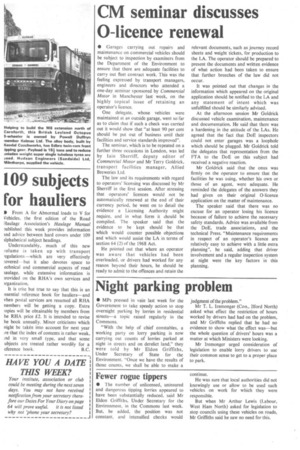CM seminar discusses 0-licence renewal
Page 53

If you've noticed an error in this article please click here to report it so we can fix it.
• Garages carrying out repairs and maintenance on commercial vehicles should be subject to inspection by examiners from the Department of the Environment to ensure that there are adequate facilities to carry out fleet contract work. This was the feeling expressed by transport managers, engineers and directors who attended a one-day seminar sponsored by Commercial Motor in Manchester last week, on the highly topical issue of retaining an operator's licence.
One delegate, whose vehicles were maintained at an outside garage, went so far as to claim that if such a check was carried out it would show that "at least 90 per cent should be put out of business until their facilities and service standards improved".
The seminar, which is to be repeated on a further three occasions in London, was led by lain Sherriff, deputy editor of Commercial Motor and Mr Terry Goldrick, transport facilities manager, Allied Breweries Ltd.
The law arid its requirements with regard to operators' licensing was discussed by Mr Sherriff in the first session. After stressing that operators' licences would not be automatically renewed at the end of their currency period, he went on to detail the evidence a Licensing Authority might require, and in what form it should be compiled. The speaker said that the evidence to be kept should be that which would counter possible objections and which would assist the LA in terms of section 64 (2) of the 1968 Act.
He pointed out that where an operator was aware that vehicles had been overloaded, or drivers had worked for any reason beyond their hours, he should be ready to admit to the offences and retain the relevant documents, such as journey record sheets and weight tickets, for production to the LA. The operator should be prepared to present the documents and written evidence of what action had been taken to ensure that further breeches of the law did not occur.
It was pointed out that changes in the information which appeared on the original application should be notified to the LA and any statement of intent which was unfulfilled should be similarly advised.
At the afternoon session Mr Goldrick discussed vehicle examination, maintenance and documentation. He said that there was a hardening in the attitude of the LAs. He agreed that the fact that DoE inspectors could not enter garages was a loophole which should be plugged. Mr Goldrick told the delegates that representation from the FTA to the DoE on this subject had received a negative reaction.
Mr Goldrick said that the onus was firmly on the operator to ensure that the facilities he was using, whether his own or those of an agent, were adequate. He reminded the delegates of the answers they had given on their original 0-licence application on the matter of maintenance.
The speaker said that there was no excuse for an operator losing his licence because of failure to achieve the necessary safety standards. Advice was available from the DoE, trade associations, and the technical Press. "Maintenance requirements in respect of an operator's licence are relatively easy to achieve with a little extra planning", he said, adding that driver involvement and a regular inspection system at night were the key factors in this planning.






































































































































































